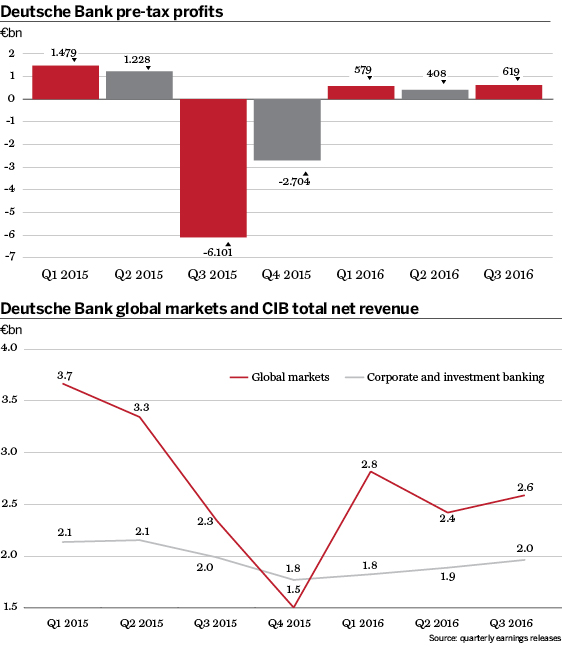Germany’s biggest bank is enduring one of the toughest periods of its 146-year history. Danielle Myles reveals the quarterly figures that give cause for hope.
Few banks have made headlines in the way that Deutsche Bank has over the past two years – and for the wrong reasons. In 2015 it was fined a record $2.5bn for manipulating the Libor benchmark rate, saw its co-CEOs resign, failed US stress tests and reported a €6.8bn loss – its first since the financial crisis.
Two-thousand and sixteen began with speculation that the bank would miss coupon payments on its contingent convertible bonds, followed by another failed US stress test and a Department of Justice request to pay $14bn to settle mis-selling claims (it has let the bank file a counter-proposal). All the while, its share price has plummeted, hitting a 30-year low in September 2016.
In announcing the third-quarter 2016 results, CEO John Cryan lamented that developments such as these have overshadowed Deutsche Bank’s operating strength. He makes a good point. Quarterly reports paint an encouraging picture of its key businesses, and reveal that the costs hurting its profitability are increasingly associated with its radical restructuring, known as Strategy 2020.
After respectable pre-tax profits of €1.48bn and €1.23bn in the first and second quarters of 2015, respectively, losses kicked in during the second half of the year. Its €6.1bn pre-tax loss in the third quarter of 2015 was its biggest ever, but this was mainly down to €5.8bn-worth of ‘impairments of goodwill and other intangibles’. This is an accounting requirement to reflect the difference in book value and fair value of its corporate and investment banking (CIB), markets and retail divisions – including rising capital requirements.
The fourth quarter of 2015 marked a turning point for the bank; the implementation of Strategy 2020 ramped up, and it edged towards profitability. Of its €2.7bn pre-tax loss, €2bn was attributable to restructuring, severance and litigation charges. The bank recorded pre-tax profits in the first three quarters of 2016 – peaking at €619m in in the third quarter.
This was despite increasing its IT investment throughout the year, in line with its Strategy 2020 plan to modernise its technology infrastructure. Other expenses have dropped. In the third quarter of 2016 it registered €1bn of costs for litigation, restructuring, severance, impairments and de-risking its non-core unit. That is less than litigation costs alone in the first and second quarters the year prior, which were €1.5bn and €1.2bn, respectively.
While litigation charges and impairments weighed down pre-tax profits, income from its two biggest revenue generators – CIB and global markets – stopped Deutsche Bank falling further into the red. CIB revenues dipped in the latter half of 2015, but grew quarter on quarter over 2016.
Its third-quarter 2016 revenues of €1.96bn were down just 8% on the first quarter of 2015. This was a quarter in which Deutsche Bank’s overall revenues were close to record levels, principally driven by CIB and global markets. The division’s biggest contributors have consistently been cash and securities services, and debt origination.
Global markets revenues took a battering over 2015, losing 59% between the first and fourth quarters. It recovered strongly over the first three months of 2016 though, driven by a 65.98% spike in debt, foreign exchange and rates. Revenues dipped the following quarter before growing in the third quarter, largely due to credit and rates products.
These operating revenues were achieved despite the bank’s exit from trading selected asset classes, withdrawal from certain countries, and rationalisation of client relationships as part of its Strategy 2020. These figures – not its bottom line – are a more important measure of Deutsche Bank’s long-term prospects.



